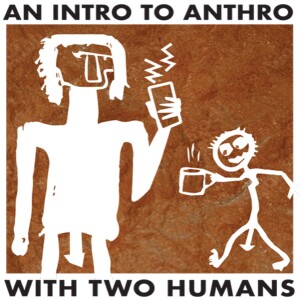
Monday Jul 07, 2025
Episode 78: BYOP (Bring Your Own Pronoun): The Profound Power of Personal Pronouns.
Pronouns are little words that cause big problems. In this episode, The Two Humans discuss the quest for a non-gendered, third-person, personal pronoun.
Episode 78: BYOP (Bring Your Own Pronoun): The Profound Power of Personal Pronouns.
An Intro to Anthro with 2 Humans
Human Number One, John McCray, and Human Number Two, John Lehr, re-assess what it means to be human.
http://www.intro2anthro.podbean.com
https://www.facebook.com/profile.php?id=100093893313542
IG @introtoanthrowith2humans
Merch: www.cafepress.com/shop/TheCaveShoppe/products?designId=136195011
Resources:
Anderson, James
1792 Grammatical Disquisitions. The Bee or Literary Weekly Intelligencer, Volume Eleventh, James Anderson, Edinburgh, Scotland, pp. 120-130.
Baron, Dennis
2020 What’s Your Pronoun? Beyond He & She. Liveright Publishing Corporation, New York, NY.
Behrens, Susan J.
2014 English Pronouns Revealed. Research and Teaching in Developmental Education, Spring 2014, Vol. 30, No. 2, (Spring 2014), pp. 91-95.
Blake, Frank R.
1934 The Origin of Pronouns of the First and Second Person. The American Journal of Philology, Vol. 55, No. 3 (1934), pp. 244-248.
Bullock, Barbara
2001 On the Use of ils for elles: Gender Syncretism in the History of French. The French Review, Mar., 2001, Vol. 74, No. 4 (Mar., 2001), pp. 700-709
Curzan, Anne
1996 Third Person Pronouns in the ‘Peterborough Chronicle.’ Neuphilologische Mitteilungen, 1996, Vol. 97, No. 3 (1996), pp. 301-314.
Fleming, Grace
2018 Dangling Participle: Explanation and Examples. ThoughtCo.com, December 22, 2018, www.thoughtco.com/what-is-a-dangling-participle-1857150.
Flom, George T.
1908 Contributions to the History of English. I: The Origin of the Pronoun “She.” The Journal of English and Germanic Philology, Apr., 1908, Vol. 7, No. 2 (Apr., 1908), pp. 115-125.
Foertsch, Julie and Morton Ann Gernsbacher
1997 In Search of Gender Neutrality: Is Singular “They” a Cognitively Efficient Substitute for Generic “He”? Psychological Science, Mar., 1997, Vol. 8, No. 2 (mar., 1997), pp. 106-111.
Grammarly.com
2024 What Are Split Infinitives? Meaning and Examples. Grammarly.com, January 18, 2024, www.grammarly.com/blog/grammar/split-infinitives/.
Hogan, Pat, Gayle Roberts and Farren Gillaspie
2017 Why Does Language Matter? Counterpoints, 2017, Vol. 485, Basically Queer: An Intergeneration Introduction to LGBTQA2S+ Lives (2017), pp. 8-17.
Hope, Jonathan
1993 Second Person Singular Pronouns in Records of Early Modern ‘Spoken’ English. Neuphilologische Mitteilungen, 1993, Vol. 94, No. 1 (1993), pp. 83-100.
HRC Foundation
2025 Glossary of Terms. Human Rights Campaign (website), accessed May 26, 2025, www.hrc.org/resources/glossary-of-terms.
Kottak, Conrad Phillip
2011 Cultural Anthropology: Appreciating Cultural Diversity, Fourteenth Addition. McGraw-Hill, New York, NY.
Lakoff, Robin Tolmach
1975 Language and Woman’s Place in Language and Woman’s Place: Text and Commentaries (ed. by Mary Bucholz), 2004, Oxford University Books, Oxford, UK.
1990 Talking Power: The Politics of Language. Basic Books, New York, NY.
Livia, Anna
2001 Pronoun Envy: Literary Uses of Linguistic Gender. Oxford University Press, New York, NY.
MacNamara, Jessica, Sarah Glann and Paul Durlak
2017 Experiencing Misgendered Pronouns: A Classroom Activity to Encourage Empathy. Teaching Sociology, JULY 2017, Vol. 45, No. 3 (JULY 2017), pp. 269-278.
Martyna, Wendy
1980 Beyond the “He/Man” Approach: The Case for Nonsexist Language. Signs, Spring, 1980, Vol. 5, No. 3 (Spring, 1980), pp. 482-493.
McWhorter, John
2025 Pronoun Trouble: The Story of Us in Sevel Little Words. Avery, New York, NY.
Pennebaker, James W.
2011 The Secret Life of Pronouns: What Our Words Say about Us. Bloomsbury Publishing, New York, NY.
Schilt, Kristen and Laurel Westbrook
2015 Bathroom Battlegrounds and Penis Panics. Contexts, SUMMER 2015, Vol. 11, No. 3, Moving through Time and Space (SUMMER 2015), pp. 26-31.
Scribendi.com
2025 Where Did the Oxford Comma Come From, and Why Is It So Important?. Scribendi.com (website), accessed July 5, 2025, www.scribendi.com/academy/ articles/oxford_comma_importance.en.html.
Shakespeare, William
2025 Act 3, Scene 1 from Romeo and Juliet. The Folger Shakespeare Library (website), accessed June 11, 2025, www.folger.edu/explore/shakespeares-works/romeo-and-juliet/read/3/1/.
2025 Speech: O Romeo, Romeo, wherefore art thou Romeo. Poetry Foundation (website), accessed June 11, 2025, www.poetryfoundation.org/poems/56974/ speech-o-romeo-romeo-wherefore-art-thou-romeo.
Simpson, Paul and Andrea Mayr
2010 Language and Power: A Resource Book for Students. Routledge, Abingdon, UK.
Stock, Braxton Phoenix
2023 Understanding Gender Identity. Braxton Phoenix Stock, Coppell, TX.
Svartengren, T. Hilding
1927 The Feminine Gender for Inanimate Things in Anglo-American. American Speech, Dec., 1927, Vol. 3, No. 2 (Dec., 1927), pp. 83-113.
Swick, Ed
2011 English Pronouns and Prepositions (Second Edition). McGraw-Hill, New York, NY.
Vocabulary.com
2025 “Dangling Participle.” Vocabulary.com Dictionary (website), accessed June 10, 2025, https://www.vocabulary.com/dictionary/dangling participle.
Yorkston, Eric and Gustavo E. De Mello
2005 Linguistic Gender Marking and Categorization. Journal of Consumer Research, Vol. 32, No. 2, (September 2005), pp. 224-234.
No comments yet. Be the first to say something!